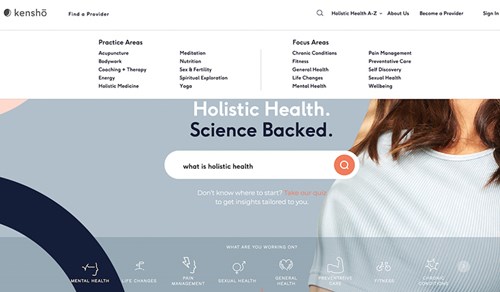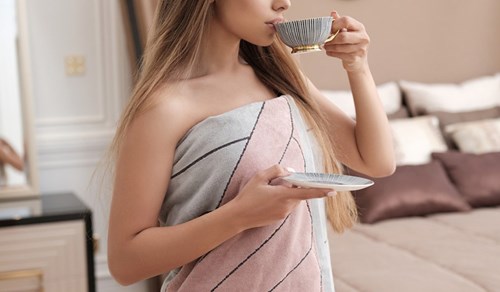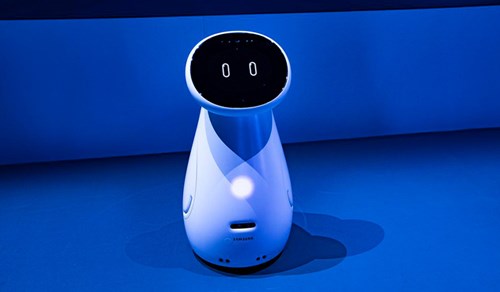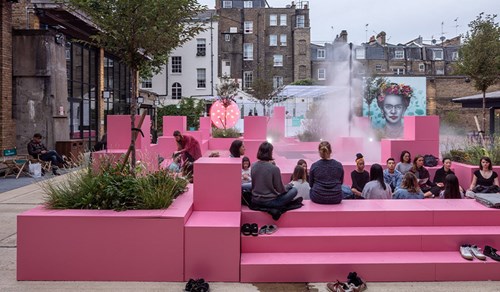INNOVATION IN A POST-COVID19 SCENARIO | article | Tuesday, March 9, 2021
TIME TO HEAL

When the post-pandemic scenario starts, it will be the time for people to heal their physical, emotional, psychological and cognitive wounds they were left with after such a hideous period. A considerable critical mass has had time to think about details in their lives and want to change what did not work during the crisis. While in recent years health and wellness were increasingly relevant factors when making decisions (see the Betterness trend, 2023), these values have now taken on an almost absolute prominence in guiding actions in society and the market. The key finding is that people do not want to return to the pre-pandemic state, but rather there is a decision to be radically better off. Consumer demands will be aligned to this immediate objective.
During the pandemic, the most primal human fears have been heightened: the fear of death and social isolation. The dramatic images caused by the health emergency have been engraved in the collective memory. Children have nightmares in which COVID-19 attacks them, older adults feel they have lost valuable time in the last years of their lives, many individuals are afraid of infecting their relatives and causing their death. An increase in psychological illnesses has been observed in most societies: anxiety, depression, loneliness and stress. Even in an optimistic horizon where vaccination campaigns are a success, companies will speak to consumers marked by the traumatic imprint of this period. In each country, the health crisis has combined with other social, cultural, political and economic tensions to create complex and explosive scenarios in terms of social mood. With little room to be naïve, any brand action should be relevant, realistic and empathetic to connect deeply with the audience's sentiment.
The prolonged disruption of life as a consequence of the waves of the virus expansion together with the increased awareness that other similar threats could emerge in the future, causes people to change habits, values and demands on a permanent basis, leaving behind the mere emergency strategies applied during the first months of the pandemic. Among the many changes is the desire to feel better physically, mentally and emotionally by taking care of oneself more regularly (prevention and self-care).
People do not have all the necessary and reliable information on what are the healthiest habits according to their individual nature. In fact, the avalanche of technical information ("probiotics", "hyaluronic", "biophilic") or abstract concepts ("natural", "organic", "green") tends to confuse them. Transparency and building trust around the offer is key. Kenshō Health is a directory and information service that fuses science and holistic medicine. It aims to be a medium that brings scientific rigor and data to wellness so as to bring confidence to users through knowledge. The company ensures that all care providers on the platform are 100% validated through a full background check. Providers are endorsed by Stanford University, Harvard University, Columbia University, among others.

In 2020, it was observed how people adopted different diets and dietary philosophies which they abandoned within a few months to replace them with others, and then, others. In such a frantic process, they may have discovered what makes them better and, more importantly, what does not. This openness to try new nutritional formulas -but also cosmetic, therapeutic, sports and spiritual ones- is paramount. There is a great chance for companies to become allies of consumers by helping them transition to habits that improve their well-being in a progressive path that brings individual knowledge. Thus, a collaborative process of personalization of the products, services and experiences between the consumer and the brand emerges. Skintelli makes use of the science of epigenetics to analyze the current quality of a person's skin to give advise on the most suitable products from different companies. Chronomics is a startup that helps prevent future diseases while analyzing the dynamic health and well-being of users based on epigenetic information found in their DNA. DNAFit, VITL, Rightangled and FitnessGenes provide personalized advice on nutrition and sports routines based on the analysis of the user's DNA and physical-genetic characteristics.
The holistic concept of wellness, which integrates health, nutrition, beauty, sexuality and psychology, will dominate the stage. The design of cross-cutting offers that combine products, services and suplementary experiences from different fields and firms, will be the norm. It is becoming increasingly common for skin care brands to turn to science. Collaborations with experts from MIT and Nobel Prize winners enable us to formulate products that consumers can trust. The Augustinus Bader brand, known for introducing stem cells and biomedicine into cosmetic formulas, has created a hand cream that helps with dryness from over-washing, the new routine to prevent the spread of the COVID-19 virus. The company patented a "TFC8 technology" that uses amino acids, vitamins and "synthesized versions of molecules found naturally in the skin".
These collaborations in the market also result in products with enhanced properties that act at the same time on different aspects of well-being. Sildior is a luxury towel that helps keep skin hydrated and flawless and, according to its creators, is able to stop the physical signs of aging. The towel uses a specially-designed fabric with the incorporation of an anti-aging protein. It is woven with 100% mulberry silk, a high-quality fiber obtained from the cocoon of the silkworm, Bombyx Mori, also responsible for producing the protein called Sericin, which is found in most cosmetics for its ability to moisturize the skin and reduce the presence of wrinkles.

The wish to access micro-experiences of well-being will cross all sectors and demographic groups, transcending social, cultural and economic boundaries. The incorporation of self-care rituals into daily life will continue to grow. The guideline will be to offer a variety of affordable therapeutic experiences rather than a luxury spa. HotBox is a wood-fired sauna on wheels that can be placed in different locations and offers visitors sauna time in 10-minute sessions with breaks to hydrate and refresh in an outdoor shower. Be Time and Calm City are mindfulness meditation studios set up in small trucks that can be located in any neighborhood for small groups to enjoy. A range of online and offline treatments will gain ground to help people heal, recover and move forward in day-to-day life. Habit, in Hong Kong, designs multifunctional fitness-focused furniture for small spaces, such as sleek, streamlined wooden tables and chairs that double as exercise benches and dumbbells.
People will want to live a healthy life in a healthy habitat, so they will want more information about the quality of the environment around them, as well as tools to manage the negative impact of toxic environments on their health. NotAnotherOne has designed a portable air quality monitor to monitor local pollution levels that sends data to the user's cell phone via Bluetooth and issues an alert to let the person know they are exposed to toxic air. Samsung Bot Air is a robot that navigates around the house autonomously equipped with sensors that measure air quality. If it finds that the air is polluted, it moves to the source to begin purifying it.

The concept of spaces will move towards a design with a more human point of view, conceived for their inhabitants to stay, enjoy and evolve in their skills. The design and aesthetic criteria will take more into account the subjectivity and sensitivity of individuals to generate positive effects on mood. A Space For Being is an experience designed by Google Design Studio and Reddymade based on the principles of neuroaesthetics to explore the relationship between the aesthetic characteristics of spaces and their influence on the well-being of users according to their particular nature. As a healing bubble, the house will begin to be conceived as a space for physical, emotional and cognitive recovery in the face of an aggressive, uncertain and unreliable context. The household scenario will incorporate new wellness functions and personal and family self-care rituals. Envisioned to be used at home, Umay Rest is a meditative heat therapy device (with natural thermal oils) to refresh the eyes, facilitate mental rest and improve sleep, combating the damage caused by spending 10 hours a day in front of a digital device. Lidl's Silvercrest Face Mask Maker allows users to make their own homemade hydrogel masks, using collagen tablets and organic ingredients of their choice, such as fruit juice, milk or yogurt that can be found in users' refrigerators. The criteria of functionality, comfort and therapeutic properties will be key in the design of housing and domestic wellness experiences.
The convergence of knowledge fields and sectors will accelerate to create products, services, experiences and spaces from a 360° wellness perspective: architecture, medicine, textiles, nutrition, medicine, biology and psychology. Skin II, developed by microbiologist Dr. Callewaert (Ghent University) and designer Rosie Broadhead, is a concept of garments made from fabrics with probiotics, capable of generating positive effects on the wearer's skin thanks to the action of bacteria. The latest generations of wearables integrate emotional measurement and stress management tools for a more holistic approach to health. Amazon is launching its first fitness tracker. Its main selling point is emotional analysis through voice recognition technology: the device detects emotional states based on the tone, intensity, rhythm and tempo of the user's voice and marks "notable moments" throughout the day. Some of the emotional states identified can be: hopeful, ecstatic, hesitant, bored, regretful, happy, worried, confused and affectionate.
Healing will also be a collective process that will involve, in the first place, the essential social ties (family and close friends) and, secondly, the close community that one dwells in. Designer Guntra Laivacuma created The Empathy Gym, a narrative board game that trains players to develop empathy for others by sharing stories about emotions, actions and sensations. In its warm-up phase, the game asks participants to practice recognizing emotions through facial expressions. In the exercise phase, it trains players to develop better listening skills. Finally, in the cool-down phase, the game allocates time for people to reflect on their experience.
The creation of circles of support will become an indispensable strategy to generate certainty and containment in a threatening environment where many have lost family, friends and acquaintances. There will be an appropriation of the neighborhood, now understood as a fundamental physical and human space to improve the quality of life and support others. Bompas and Parr's Paradise Now was a free, open-air installation that invited people in the neighborhood to collectively enjoy a sunset on vitamin-infused dunes; rehydrate under waterfalls of mist; and cleanse themselves with mineral-enriched rainwater from exotic springs around the world.

People's desire to change toxic habits for healthy living and consumption practices opens up an infinite horizon of business opportunities. However, any proposal for products, services and experiences should be based on values such as vitality, transparency, safety, empathy and sustainability to collaborate in the goal of improving well-being. Leading brands will be those that take care of their consumers, make their lives easier and contribute to their happiness. Healing will be an individual and collective task.
